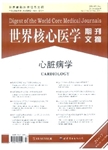应激后心血管功能恢复障碍可预测血压3年升高
Impaired cardiovascular recovery following stress predicts 3- year increases in blood pressure作者机构:Psychobiology Group Department of Epidemiology and Public Health University College London 1- 19 Torrington Place LondonWC1E 6BT United Kingdom
出 版 物:《世界核心医学期刊文摘(心脏病学分册)》 (Digest of the World Core Medical Journals(Cardiology))
年 卷 期:2005年第1卷第10期
页 面:58-59页
学科分类:1002[医学-临床医学] 100201[医学-内科学(含:心血管病、血液病、呼吸系病、消化系病、内分泌与代谢病、肾病、风湿病、传染病)] 10[医学]
主 题:心血管功能 外周血管阻力 抗高血压药物 率变异性 共变量 心血管应激反应 基线值 心脏指数 心血管病史 纵向研究
摘 要:To assess whether variation in the rate of cardiovascular recovery following exposure to acute psychological stress predicts changes in blood pressure longitudinally, independently of blood pressure at baseline and other covariates. Design: A 3- year longitudinal study. Participants: A total of 209 men and women aged 45- 59 years at baseline, with no history of cardiovascular disease including hypertension. Method: Measurement of blood pressure, heart rate, heart rate variability, cardiac index and total peripheral resistance at rest, during two moderately stressful behavioural tasks and up to 45 min post-stress. Stress reactivity was defined as the difference in values between tasks and baseline, and post-stress recovery as the difference between recovery levels and baseline. Outcome measures: Resting blood pressure measured at baseline and 3 years later. Seven individuals had been prescribed hypertensive medication on follow-up. Results: Increases in systolic blood pressure(SBP) were predicted by impaired post-stress recovery of SBP(P 0.001), diastolic blood pressure(DBP)(P 0.001) and total peripheral resistance(P=0.003), independently of baseline blood pressure, age, gender, socio-economic status, hypertensive medication, body mass and smoking. The adjusted odds of an increase in SBP ≥ 5mmHg were 3.50[95% confidence interval(CI) 1.19 to 10.8] for individuals with poor compared with effective post-stress recovery of SBP. Three year increases in diastolic pressure were predicted by impaired recovery of SBP(P 0.001) and DBP(P=0.009) pressure and by heart rate variability during tasks(P=0.002), independently of covariates. Conclusions: Impaired post-stress recovery and less consistently heightened acute stress reactivity may index disturbances in the regulation of cardiovascular stress responses that contribute to longitudinal changes in blood pressure in middle-aged men and women.



